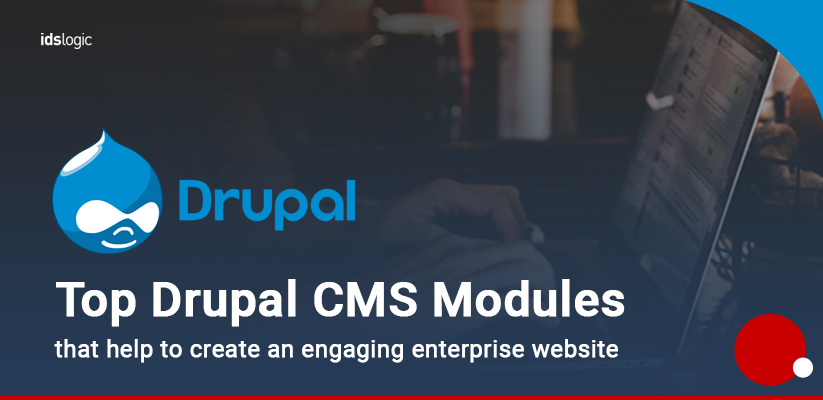
Top Drupal CMS Modules that Help to Create an Engaging Enterprise Website
Drupal CMS is a popular platform that offers a wide range of features for creating customized enterprise website and applications. It is especially appreciated because of its immense flexibility when it is about dealing with the custom post types, it also offers a higher security and control over the users and allows a permission controls with its advanced user management and access settings based on the users’ profile.
However, there are various other factors that have a great influence on making an engaging enterprise website that helps the visitors to engage with the brand, bookmark the site and also share the web content.
So, while creating a website using Drupal 8 development, you may require various modules to create notable and high quality content and it is essential to choose interactive modules so that your website is both convenient to use and helps to keep your audience engaged. Here in this blog, I will share with you some of the most useful Drupal modules that can enhance the core functionality of your website.
The Dfferent Types of Drupal Modules:
- Contributed Modules: These are the modules that can be easily downloaded from the drupal.org but it is not available in the Drupal core package. These are usually developed by third party contributors.
- Core Modules: These are the modules that are needed in every part of Drupal website installation for example the modules assist in managing the user accounts, navigation menus and also content fields.
- Custom Modules: These are self-explanatory and the codes are usually developed for a specific project as per the requirements.
Useful modules that a Drupal web development company in India can use to enhance the capabilities of a website.
The Entity Browser:
This is a Drupal module that is very useful when it comes to interactions with various digital media channels. It is a flexible tool that helps in creating, browsing and even choosing some media files in a smooth and easy manner. By using this module, the developers can easily drag and drop multiple files at a time and it also helps to enhance the search capabilities. It also enables the WYSIWYG editor.
The Views Module:
This module is also a popular one used by the Drupal developers, which allows them to sort as well as display type of content, subject, date, author and etc. It is a great tool that is used to generate custom mash ups of the content, lists, reports, tablets, create dynamic grids, navigation and RSS feeds.
The module can be used to pull out information for your site and views can be configured to display different results that are based on the interactions that are made by the visitors. The users can easily modify the views of the blog and generate page layouts according to their choice.
Also Read: The Journey of Drupal from 1.0 To Drupal 8
Disqus:
Comments are often considered a great means of creating user engagement on any given web content like blogs or articles. Since it allows the readers to share their feedbacks and views on the related posts, it is highly effective in making the Drupal CMS website engaging. Drupal comes with a comment module as its core feature and it can easily integrate with your website and allow the users to login from their Facebook, Google or Twitter accounts and post a comment.
Panels:
Once you have hired your Drupal CMS developers, they can easily use the drag and drop feature to create websites having customized layouts. These layouts are very helpful in displaying various types of content and they have an additional advantage of actively changing and even customizing the content. The feature is very unique and you won’t find this in many other CMSs. Panels help Drupal users to create educational websites and it is also a great module for every business site.
Social Media Modules:
This module allows the readers to share the blogs and other web content on their social media accounts, which is a great means of promoting the content on social platforms. You can easily integrate the blog with this social media module and it offers a centralized means of handling social media information like Share and Follow buttons. The module is a one stop social tools that help to reach out to your target audience and helps them to engage with the site.